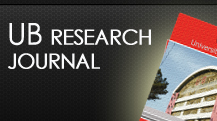(print) ISSN 0115 – 2521
(online) ISSN 2945-3321
The UNIVERSITY OF BAGUIO Research Journal is published semi-annually in June and December by the University of Baguio Research Innovation Extension and Community Outreach (RIECO), Baguio City, Philippines. Its general objective is to scholarly research works in the different fields of knowledge. Its specific objective is to encourapublish ge research on the culture of the different ethnic groups of the Cordilleras and on problems and issues regarding CAR and neighboring regions.
Baguio Research Innovation Extension and Community Outreach (RIECO), Baguio City, Philippines. Its general objective is to scholarly research works in the different fields of knowledge. Its specific objective is to encourapublish ge research on the culture of the different ethnic groups of the Cordilleras and on problems and issues regarding CAR and neighboring regions.
The University Research Journal spotlights how University of Baguio extend their academic interests beyond the classroom. The specific objectives are: to encourage research on the culture of the different ethnic groups of the Cordilleras and on problems and issues regarding the Cordillera Administrative Region (CAR) and neighboring regions.
The UB Research Journal is published twice a year – January to June and July to December
Managing Editor:
UB R& DC Director
Layout Artist:
Mr. Oliver Richard C. Celi
Entered as third class mail matter at the Baguio City Post Office on December 18, 1979
ISSN 0115-2521
Copyright© by the University of Baguio
CALL FOR PAPERS
FOR AUTHORS
CALL FOR PAPERS
Manuscripts submitted for publication must be in an electronic copy and should not exceed ten (10) pages. Dimensions of the paper is 0.6″ margin on all sides, with a 6″ x 9″ paper size. Use the Times New Roman font with an 11.5 point size. The text is justified, using normal paragraphs wherein the first line is indented five character spaces from the left margin. Observe single-spaced lines within a paragraph, and double-space between paragraphs or between headings/subheadings and the subsequent paragraph. The following sections must be present in the manuscript: an Abstract of about 200 words, Background of the Study, Methodology, Results / Discussion, Conclusion and Recommendations. The Tables & Figures (optional) and References should be placed on a separate page. Authors shall assume full responsibility for conveyed opinions and the accuracy of statements in the articles.
FOR AUTHORS
Lorem ipsum dolor sit amet, consectetur adipiscing elit. Ut elit tellus, luctus nec ullamcorper mattis, pulvinar dapibus leo.
